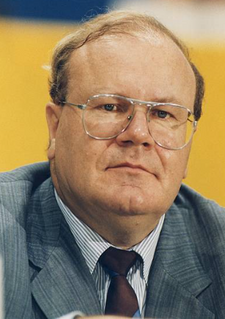Adelar Matussek
Adelar Matussek | |
|---|---|
 Matussek in 1991 | |
| 12th President of Vonzumier | |
| In office 12 July 1971 – 8 July 1991 | |
| Chancellor | Emil Fischer Nicholas Allard Ralf Katzenbach Franz Uhlmann Hugo Keitel Marcel Brausewetter |
| Preceded by | Frederick Pfeiffer |
| Succeeded by | Jakob Bridling |
| Leader of the Labour Party | |
| In office 1965–1981 | |
| Member of the House of Deputies | |
| In office 1949–1971 | |
| Personal details | |
| Born | Adelar Jarek Matussek 20 June 1915 Rossach, Vonzumier |
| Died | 29 November 1999 (aged 84) Andari, Villera |
| Political party | Labour Party |
| Education | Rossach Woodworking and Carpentry College |
Adelar Jarek Matussek (20 June 1915 – 29 November 1999) was a Vonzumierian statesman, trade unionist, and journalist who served as the 12th President of Vonzumier from 1971 to 1991. A prominent social democrat, he was a member of the Labour Party for most of his life and led the party from 1965 until 1981. He was the second-longest serving president in Vonzumierian history after Werner Sudermann, and the second president of Molvic descent after Samuel Schimanski.
Born in 1915 to second generation Luepolan and Vyzinian immigrants, Matussek was raised primarily in Kusskamp, a working class suburb of Rossach. He followed the carpentry trade like his father and joined the Guild of Vonzumierian Carpenters, eventually becoming a member of the union's executive body. He wrote for the Workers' Weekly, a socialist newspaper associated with the Labour Party, from 1936 onwards until he was conscripted to fight in the Great War in 1945. Matussek took part in the Battle of Tarphos as a seaman of the Vonzumier Navy, where he was wounded-in-combat and thereafter discharged from the military.
Upon his return to Vonzumier, Matussek worked for Wilhelm Schnabel's 1949 re-election campaign as a trade union consultant. He ran for and was elected to the House of Deputies in the same year on the Labour Party list. Matussek became known in parliament for his advocacy of a radical left-wing economic agenda, including the creation of workers' collectives and the nationalization of most industries, but moderated his stances as the political environment became more conservative. He became leader of the Labour Party in 1965, but narrowly lost the 1969 presidential election to Frederick Pfeiffer. He ran again in 1971, winning 52.6% of the vote in the first round and was thereby elected president.
As president, Matussek oversaw a dramatic expansion of the country's economy, with GDP growth averaging above 3% for most of his term. He and his allies in parliament passed laws expanding environmental and workers' protections, civil liberties for women and minorities, and increased spending on foreign aid and outreach programmes. In 1987, he signed a package of civil rights legislation that criminalized racial, ethnic, and gender discrimination in Vonzumier, and introduced term limits for members of parliament in 1989. In foreign affairs, Matussek pursued closer relationships with the Aitic Union, Zaihan, and Vonzumierian allies in the CSO and Patyria. He gave financial and military aid to Luepolan rebels and Caraqi independence fighters, forced Tierada to withdraw from many of its Tusolan colonial territories, and oversaw a peaceful resolution to the 1975 Straits of Vell crisis. Matussek's foreign policy is credited for being a key factor in the downfall of the Vierz Empire in 1990.
Constrained by term limits, Matussek could not run in the 1991 election but supported the candidacy of his groomed successor, Marcel Brausewetter, who was narrowly defeated by the conservative Jakob Bridling. He left office with extraordinarily high approval ratings of 70% or higher. Matussek retired to the Villeran spa town of Andari, where he died in 1999. He is considered by historians and the general public to be one of the greatest Vonzumierian presidents in history, often ranking 3rd in most polls behind Werner Sudermann and Wilhelm Schnabel. His funeral was attended by over five million people and watched by tens of millions worldwide.